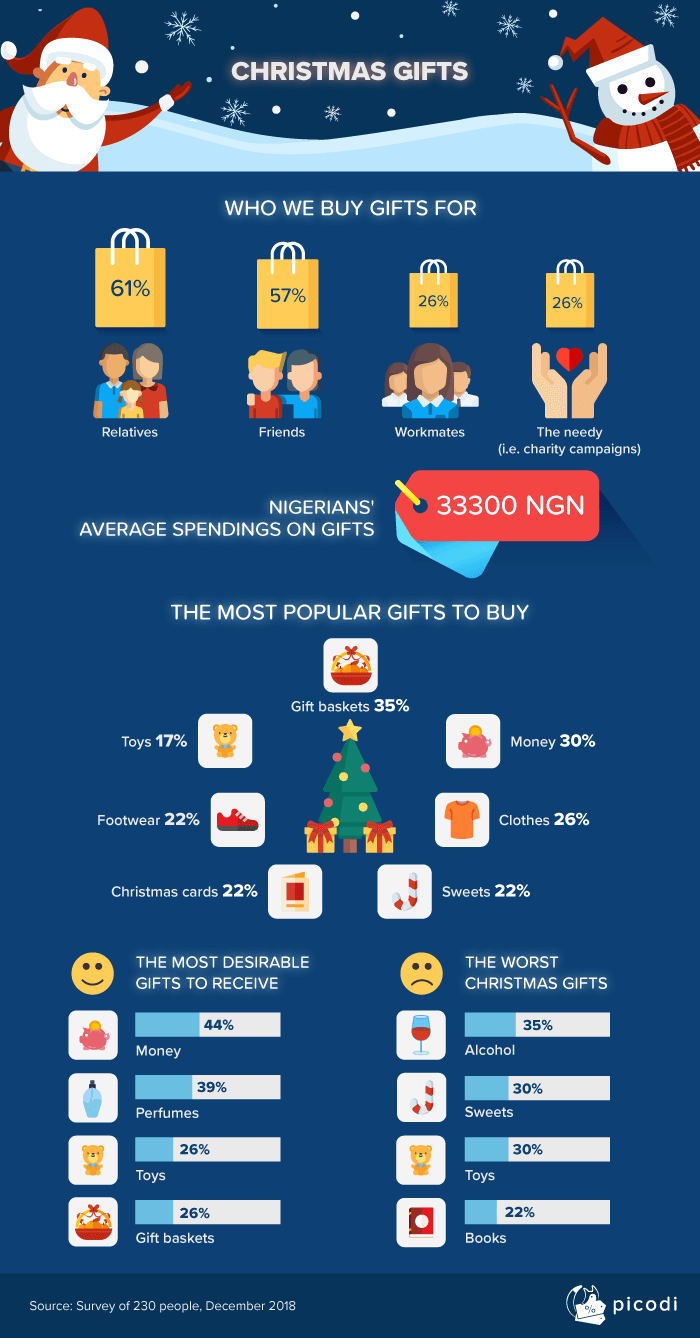
Minimum wage worldwide: where can you live off the minimum wage?
We checked which countries have the most favourable ratio of basic grocery prices to minimum wage around the world
How Nigerians prepare for Christmas
Christmas time is not just family reunions and decorating the Christmas tree. The last few weeks of the year are also a big burden on our home budget since we have to accommodate additional expenses, such as Christmas gifts, food and sometimes even elegant outfits.
Picodi Analysis Team decided to find out what Christmas expenses look like, what gifts Nigerians usually buy and how much it costs to put food on the Christmas table. From our report you will also learn what kind of gifts are the most desirable ones and which are a bad idea.

During Christmas we want to make our family and friends happy. 61% of respondents buy presents for their relatives. For 57% it’s a good opportunity to give their friends a gift. Our survey results show that 26% of Nigerians decide to buy gifts also for their colleagues. And, 26% of respondents declare that they help charities or make Christmas donations.
What gifts do we usually buy? According to our respondents, the most popular categories are gift baskets (35%), money (30%), clothes (26%), sweets (22%) and Christmas cards (22%).
An interesting fact is that most Nigerians (57%) leave Christmas gifts until the last moment—December. Christmas ornaments in shopping malls and special sales like the famous Black Friday ones manage to convince 26% of Nigerians to buy Christmas gifts earlier, in November. Only 17% shop for gifts in advance (9% in September and October and 8% before September).
When choosing Christmas gifts half of Nigerians try to find out what the receiver would like to get (57%). Fewer people buy gifts on a hunch (26%) and only 17% ask directly.
As the survey results show, the most desirable gifts of 2018 are money (44%), perfumes (39%), toys (26%) and gift baskets (26%). What may come as a surprise though, is that toys (30%) were also voted the least desirable gifts to receive together with alcohol (35%), sweets (30%), and books (22%). We spend 33300 NGN on average on gifts.

Most Nigerians (66%) spend Christmas at home. 30% visit their friends and 4% go abroad for Christmas.
Nigerians still buy Christmas food the traditional way: 40% shop in brick and mortar stores and markets. 17% place their orders online and the remaining 43% use both options when shopping. An average Nigerian spends 58000 NGN on Christmas food.

Is Christmas a reason to wear spick-and-span clothes? 48% of our respondents declare that they do not need new clothes and prefer those they already have in their closet. 30% of Nigerians say that they buy brand new clothes and 22% content themselves with new accessories like jewellery or ties.

24300 NGN is spent on average in Nigeria during Christmas. Half of the money is spent on gifts, food make 29% of that sum and Christmas outfit—21%.
Besides Nigeria we conducted the same survey among other nations. The result is a comparison of Christmas spending for 34 countries of Europe, Asia, America, Africa and Australia where Christmas or its equivalent is celebrated over a similar time period.
Nigeria placed 21st on our list with 24300 NGN which converted into dollars amounts to $319. Czechs are leading with $527 spent on gifts, food and clothes. For comparison, an average South African spends $313 and an average Turk spends $95.
Do not wait with your Christmas shopping until the last minute, as the most desired products sell out quickly! If you are unsure what to buy, check out stores such as Aliexpress, eBay and Wish and get inspired. With Picodi, you will earn some of the money you spend on gifts back through our cashback service.
We conducted the surveys in early December 2018 among more than 13,000 people from Europe, Asia, America, Africa and Australia in countries where Christmas or its equivalent is celebrated during the winter period. In Nigeria, 230 people took part in the survey. For currency conversion we used the average exchange rate for November 2018.
Are you willing to share the information and infographics about Christmas in Nigeria and other countries with your readers? Feel free to use all the data and infographics presented in this report for both commercial and non-commercial purposes as long as you indicate the author of the research (Picodi.com) with a link to this subpage.

We checked which countries have the most favourable ratio of basic grocery prices to minimum wage around the world

Picodi.com analysts calculated the damaging impact of smoking on the household budget

Picodi.com analysis team checked how Nigerians feel about discounts and sales

Picodi.com looked into Nigerian toiletry bags: we found out which make-up products are the most loved and summed up how much money people spend on cosmetics in Nigeria and around the world.